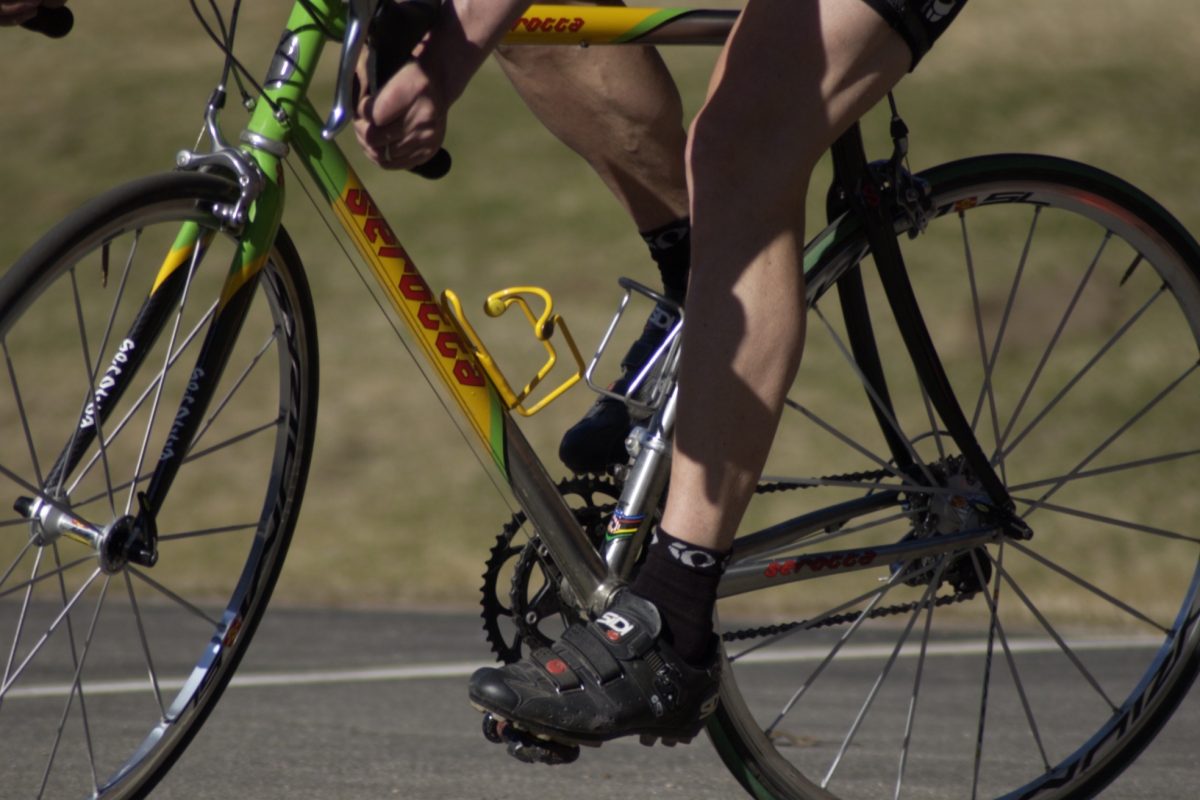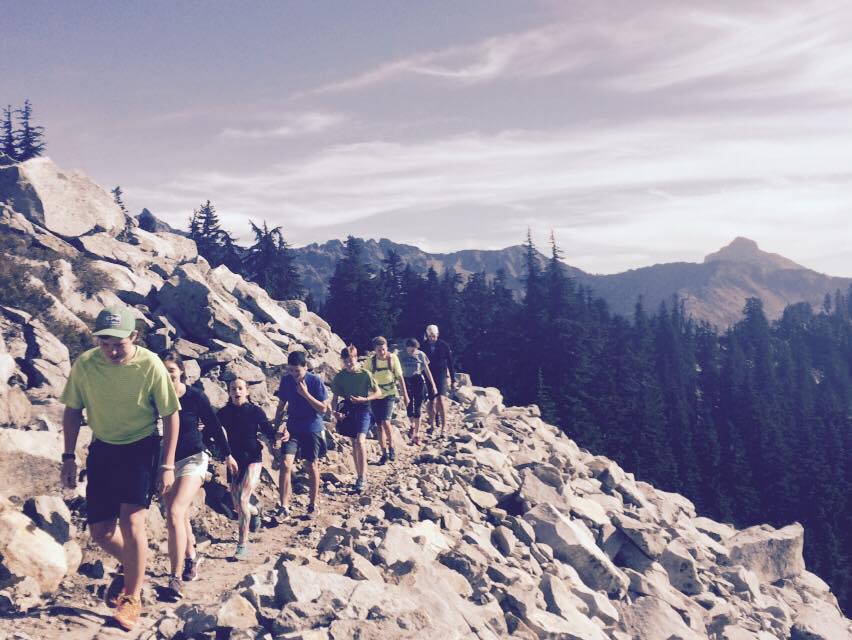
Even if you’re not a running fan, chances are you heard that former Dartmouth College standout Glenn Randall led the opening 10 k of the Boston Marathon last Monday. Actually, ‘led’ doesn’t quite describe it — he gapped the elite men’s field, confounding TV announcers and sending the running sector of the blogo-twittersphere into a frenzy.
To those who had never heard of Randall, it looked as though he was trying to grab a few minutes of fame with an opening pace he couldn’t hold. But as he explained in a blog post recapping the race, the pace he began with was actually slower than he’d intended.
Just before the pack caught him, Randall started having cramping issues. He ended up fading in the 80-degree heat to 60th place, finishing in 2:37:13.
We figured the gutsy performance was reason enough to check in with Coloradoan. The last time we did so, he was about to run his debut marathon in Chicago and the future of his ski career was in flux. He ran a 2:20:40 in Chicago, which was close enough to the 2:19 Olympic Trials qualifying time that he decided to give it one more go in Las Vegas last December.
Las Vegas didn’t pan out, but Randall has since decided to hang up his skis in order to pursue running full-time. On Friday he gave us a phone interview to talk about what happened in Boston, his racing style, and the transition away from skiing.
First things first: Boston.
FasterSkier: I’ve read your blog and know it didn’t turn out the way you’d hoped, but what were your expectations headed into the race? Did you expect to be leading the first 10 k?
Glenn Randall: I went into it looking to have a good race, and wherever that put me was where I was going to be.
I knew it was a possibility that I would be leading early on. I talked to a lot of people [beforehand] and everyone said that in Boston, you go in preparing for the uphills but it’s the downhills that kill you. So I did a lot of downhill work and got to the point where I was confident I could run pretty fast downhill putting forth zero effort. If you do downhills too fast it can take it out of your legs, and I knew where that threshold was for me.
I also knew a lot of times people don’t push those early downhills at all; they hold back because they’re worried. I went into it knowing there was a slim chance I could lead early, and my thought was that the lead group would catch me on the flats but I would be going my own pace… before I had to deal with whatever anyone else was doing.
So, I ended up going slower than I’d prepared for the first couple (mostly downhill) miles. I was going about 4:50 per mile pace, and I’m capable of about 10-15 seconds per mile faster without taking too much out of my legs. I was holding back because I was nervous about the heat and didn’t want to go blasting out faster than I was capable of going.

FS: Were you aware of the distance you’d put on the main pack?
GR: I don’t look back [but] I could tell they were no longer within earshot. I had some friends in town and could hear them cheering — that was one way I could tell how far behind me people were.
FS: You said you didn’t seem too worried about putting that kind of distance on the best marathoners in the world.
GR: Yeah, I felt good. On top of that, if I go into the race completely terrified of them, I’m not going to have the best race I can have.
FS: What happened after the pack caught you?
GR: I’ve spent a lot of time thinking about what went wrong. It started with stomach cramps and moved from there. Heat was a part of it, and because it was so hot I was maybe over-hydrating before and during the race.
I’ve looked at the things that held me back, and will try to make sure I don’t make the same mistakes in the future.
As far as going out like that goes, when it comes to big races, I go out there racing like I’m going to have a good race. Because frankly, the difference between having a kind-of bad race and a really bad race — it may seem like a lot, but functionally it’s the same for me. So if I just go out and assume I’m going to have an awesome race, until I knew differently I feel like in the long term it’s going to help me out.
When people conserve, they’re looking to have a kick, and that’s not something I do. But a lot of people go out there and take big risks. Right before the race I saw Joan Benoit Samuelson, and it was pretty inspiring. She’s an icon in American marathoning, and if you know her story, everyone expected [the 1984 Olympic marathon] to come down to Grete Waitz and Ingrid Kristiansen. Joan was kind of injured, so no one thought she’d be a factor. It was hot, and she went out pretty fast from the get-go, but nobody went with her because everyone thought she’d be coming back. She ended up holding on for the win.
FS: How do you feel about your start now?
GR: I don’t have any regrets about the whole thing. The things that went wrong would have gone wrong if I’d gone out at a conservative pace. I went out there, tried to have a great race, and it didn’t happen. But I was going to have those problems regardless, I think.
I was still trying to race at the end — when people passed me I’d try to go with them — but it was a rough day.
(In the 80-degree Boston heat, a lot of people had a rough day. B.A.A. was so “worried about someone dying on them out there” that it encouraged less experienced runners to sit out the race by allowing competitors to defer their entry to 2013. About 4,000 entrants failed to start, but even so, over 100 people ended up in the hospital afterwards to be treated for dehydration or heat exhaustion.)
FS: What do you think of the internet discussion that’s been going on about you?
GR: I haven’t read it, and it doesn’t bother me at all. Those who mind don’t matter and those who matter don’t mind.
I’ve had a lot of Dartmouth alumni contact me, and they all know I wasn’t trying some stunt. They’ve commended me on the fact that I actually had the guts to go out there and do that.
FS: Moving away from Boston — you’re clearly a full-time runner now, but last we talked you still thought you might keep skiing. When did you make that decision?
GR: It dawned on me that I was supporting a pro ski career with a pro running career. And on top of that, sometimes it seemed like it was not meant to be. The way that last season was, I looked at it and said, ‘Wow, I’m not sure if this is what I’m supposed to be doing.’ I’d get sick at an inopportune time, and we got in a van accident on the way to a race I was confident in. It seemed like things were just going wrong, and it made me wonder if that was just the universe’s way of telling me, ‘You’ve had a great run at it; move on and find something else to excel at.’
After Chicago, I realized I’d been close to making the Olympic Trials, and I made a lot of mistakes at Chicago, just a huge number, so I thought I had the ability to do better. I had a couple more months in the Trials window, so I just put everything into that. It didn’t end up happening, but last summer I also discovered the mountain running scene, and I’m really looking forward to a great summer of mountain running.
FS: The pro skiing options in the U.S. are pretty limited: there’s the SuperTour, and maybe a few marathons. Running’s a much bigger, better-supported sport. Did that factor into the switch?
GR: That’s definitely a part of it. On the SuperTour, if you’re trying to make money off of it, it’s easier said than done. You’re trying to break even, and everyone showing up is looking for that prize money. So the reality is, it doesn’t work out all that well.
With running [for example], Boston gave me a free entry. The race in Switzerland I’m going to, from the time I show up until after the race is over, I have free room and board for the entire week. Last year they paid me to run the race, plus there was prize money. It’s much easier to actually make ends meet.
FS: What races have you got lined up next?
GR: Mt. Washington, and then the race in Switzerland in August. If I’m top-six at Mt. Washington, I’m racing in the World Mountain Running Championships in Italy.
Audrey Mangan
Audrey Mangan (@audreymangan) is an Associate Editor at FasterSkier and lives in Colorado. She learned to love skiing at home in Western New York.




One comment
JimGalanes
April 24, 2012 at 8:45 am
Way to go Glen. Great effort go for the win!